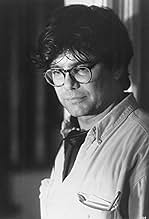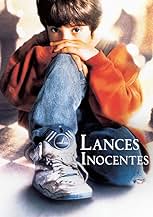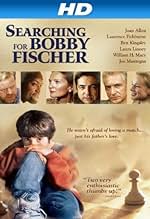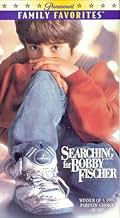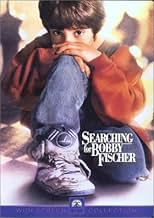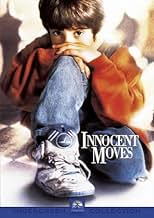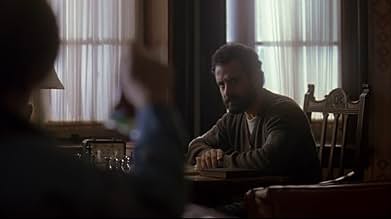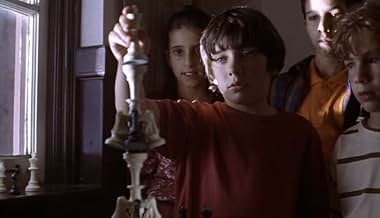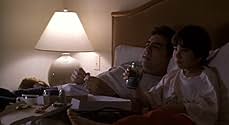Un prodigio degli scacchi in età prepuberale rifiuta di indurirsi per diventare un campione come il famoso ma improbabile Bobby Fischer.Un prodigio degli scacchi in età prepuberale rifiuta di indurirsi per diventare un campione come il famoso ma improbabile Bobby Fischer.Un prodigio degli scacchi in età prepuberale rifiuta di indurirsi per diventare un campione come il famoso ma improbabile Bobby Fischer.
- Regia
- Sceneggiatura
- Star
- Candidato a 1 Oscar
- 6 vittorie e 11 candidature totali
Recensioni in evidenza
In SEARCHING FOR BOBBY FISCHER, Steven Zaillian's is the most complete and near-flawless film-work of the 1990s. I can't say merely "director's work" because he also wrote the screenplay. And (I have to presume) he chose Conrad Hall as d.p., James Horner for the music, Wayne Wahrman as film-editor, and he worked with a lighting director, sound director, set director and more -- each of whom did a job worthy of the highest praise. And the cast, the supernal cast -- many of whom have had larger and more celebrated roles, but none of whom has ever nailed a role more satisfyingly -- Kingsley, Mantegna, Allen, Fishburne -- even the smaller and cameo bits are effectively faultless -- by Linney, Stephens, Shalhoub, Pendleton. And of course, Pomeranc's work is a kind of miracle. Every part of it evokes from me applause for Zaillian's imagination, sensibility, knowledgeability, intelligence, judgment.
I confess I post this comment because none of the other comments I've seen on SEARCHING seems to me to realize how much Zaillian must have contributed to making this -- and I think it deserves this adjective -- GREAT movie. (I further confess I didn't first watch the movie until some three years after its debut because of its title. I was damned if I wanted to spend two hours in the presence of someone as nasty-seeming as Fischer. But the title of course was Fred Waitzkin's, the author of the source book. Fred, you cost me a few years -- but Steven Zaillian has made up for it many times over.)
I confess I post this comment because none of the other comments I've seen on SEARCHING seems to me to realize how much Zaillian must have contributed to making this -- and I think it deserves this adjective -- GREAT movie. (I further confess I didn't first watch the movie until some three years after its debut because of its title. I was damned if I wanted to spend two hours in the presence of someone as nasty-seeming as Fischer. But the title of course was Fred Waitzkin's, the author of the source book. Fred, you cost me a few years -- but Steven Zaillian has made up for it many times over.)
_Searching for Bobby Fischer_ is possessive of a certain wonderful insight; it is a film that offers no heart-warming premeses and still manages to ease the soul.
The characters dwell in an utterly contemporary world; you will find no neighbors hauling in bags of money, chiming churchbells, perfect families, or million-dollar smiles anywhere in the film. At the same time, this world of this film exhibits a resilience against its crueler realities that most of the art of the twentieth century eschewed in favor of probing the darkness of existence. Yes, the main characters are prosperous, but the spectre of Fischer hangs over the world as a daunting warning of things to come. The mood of the piece, enhanced by the excellent cinematography, sets the film up to succeed wonderfully, and the actors and text deliver.
One of the things I like the most about this movie, superficially, is that it does not insult the game of chess as it depicts it. The depiction of the chess world is insightful and accurate, from the sharp division between granite-hewn chess scholars and colorful tactical wizards to the truly unequaled awe and gravity accompanying the notion of the Grandmaster. Perhaps these are things that can only truly be appreciated by those who have ventured to this world, but, thankfully, the film integrates these elements seamlessly into a universal story that is original and poignant in its detail and elegance.
Every actor in this film is spectacular, without exception. That is a bold statement, but it is completely justified. At no point do any of the actors miss a step; all the performances are smooth and appear to be utterly effortless. In their featured roles, Ben Kingsley and Lawrence Fishburne put in performances that match in art, craft, and intensity, if not in length, any of their more prominent film roles. Joan Allen is mind-bogglingly wonderful, considering how precise she has to be to fit such a massive character into such a truncated part in the script. This is Joe Mantena's very finest performance, and, of course, this movie contains child acting to match any film ever made. Even the bit parts are acted with intensity, depth, and elegance. A lot of this is easy to miss because, on the surface, the film is so even-handed, but repeated viewings continually bring to attention wonderful nuances of these performances.
Any summary or synopsis will fail to accurately relate the "message" of this film; as in any great work of art, the quickest, most efficient way to word the resolution of the film's ideas and conflicts is to watch the film. This is where _Searching for Bobby Fischer_ really shines. There is no way these characters could have ended up where they are from any other sequence of events than the one that took place; this is a wonderful example of how a plot is woven into a story rather than imposed on it. The flipside of this is that there is extremely little to be found in this film that can be applied universally without reservation, and yet it still manages to be convincing. There is something mysterious about this movie that rises toward the staggering mysteries of life, and repeated viewings are really the only means toward a full understanding of these ideas.
Undoubtedly, this is the best film made in the 1990s based on a true story (if you, like me, discount _Schindler's List_ from such assessments. It hardly seems fair to compare _Schindler's List_ to any other film due to its unique purpose.). If you have not seen it, I highly recommend it. It may just change your life.
The characters dwell in an utterly contemporary world; you will find no neighbors hauling in bags of money, chiming churchbells, perfect families, or million-dollar smiles anywhere in the film. At the same time, this world of this film exhibits a resilience against its crueler realities that most of the art of the twentieth century eschewed in favor of probing the darkness of existence. Yes, the main characters are prosperous, but the spectre of Fischer hangs over the world as a daunting warning of things to come. The mood of the piece, enhanced by the excellent cinematography, sets the film up to succeed wonderfully, and the actors and text deliver.
One of the things I like the most about this movie, superficially, is that it does not insult the game of chess as it depicts it. The depiction of the chess world is insightful and accurate, from the sharp division between granite-hewn chess scholars and colorful tactical wizards to the truly unequaled awe and gravity accompanying the notion of the Grandmaster. Perhaps these are things that can only truly be appreciated by those who have ventured to this world, but, thankfully, the film integrates these elements seamlessly into a universal story that is original and poignant in its detail and elegance.
Every actor in this film is spectacular, without exception. That is a bold statement, but it is completely justified. At no point do any of the actors miss a step; all the performances are smooth and appear to be utterly effortless. In their featured roles, Ben Kingsley and Lawrence Fishburne put in performances that match in art, craft, and intensity, if not in length, any of their more prominent film roles. Joan Allen is mind-bogglingly wonderful, considering how precise she has to be to fit such a massive character into such a truncated part in the script. This is Joe Mantena's very finest performance, and, of course, this movie contains child acting to match any film ever made. Even the bit parts are acted with intensity, depth, and elegance. A lot of this is easy to miss because, on the surface, the film is so even-handed, but repeated viewings continually bring to attention wonderful nuances of these performances.
Any summary or synopsis will fail to accurately relate the "message" of this film; as in any great work of art, the quickest, most efficient way to word the resolution of the film's ideas and conflicts is to watch the film. This is where _Searching for Bobby Fischer_ really shines. There is no way these characters could have ended up where they are from any other sequence of events than the one that took place; this is a wonderful example of how a plot is woven into a story rather than imposed on it. The flipside of this is that there is extremely little to be found in this film that can be applied universally without reservation, and yet it still manages to be convincing. There is something mysterious about this movie that rises toward the staggering mysteries of life, and repeated viewings are really the only means toward a full understanding of these ideas.
Undoubtedly, this is the best film made in the 1990s based on a true story (if you, like me, discount _Schindler's List_ from such assessments. It hardly seems fair to compare _Schindler's List_ to any other film due to its unique purpose.). If you have not seen it, I highly recommend it. It may just change your life.
Let me start by saying I am not a person who goes for sentimental, "heart on your sleeve" type big dramas that seem to be the idol of most professional critics. In fact, to put it bluntly I totally loathe them. (I prefer movies that at least try to have a cohesive plot line with a reasonably accessible story idea and some decent tight pacing; ie: something that's both informative and fun. This is my interpretation of the classic idea of "a good story, well told".)
With that in mind, I wish to state that this movie (film, whatever) really does work, at all levels. It's a good intelligent story (apparently based on fact} about a very bright, very young kid who is discovered to be naturally good at chess and enters the serious national tournaments. During which time, there are raised issues of the concept of the winning ethos; and keeping (or losing) your humanity in the process.
This cast is magnificent here. The central leads are played by Joe Mantegna and Max Pomerance as the father and son respectively. Both give very well-balanced performances. Sensitive, without being sappy. Max in particular is very good, especially in the dramatic climax of the film; which he handles with total dignity. It could have been so over the top and patronizing in lesser hands, but this time it isn't.
They are ably supported by Laurence Fishburne and Ben Kingsley as two different types of coaches, from "opposite side of the tracks" (sorry for that old cliché). It may seem formulaic, but in this case the dramatic contrasts works surprisingly well, and both come over as intelligent representatives of their particular points of view. And there are also great character moments by David Paymer {QUIZ SHOW, MR Saturday NIGHT, etc} and Hal Scardino {THE Indian IN THE CUPBOARD} as well.
Over all, I would highly commend this film as the type of story that manages to tread the fine line between intelligent ideas and an entertaining story. I recommend it to everyone. Give it half a chance and it can work for you. It really is a great example of intelligently entertaining!
With that in mind, I wish to state that this movie (film, whatever) really does work, at all levels. It's a good intelligent story (apparently based on fact} about a very bright, very young kid who is discovered to be naturally good at chess and enters the serious national tournaments. During which time, there are raised issues of the concept of the winning ethos; and keeping (or losing) your humanity in the process.
This cast is magnificent here. The central leads are played by Joe Mantegna and Max Pomerance as the father and son respectively. Both give very well-balanced performances. Sensitive, without being sappy. Max in particular is very good, especially in the dramatic climax of the film; which he handles with total dignity. It could have been so over the top and patronizing in lesser hands, but this time it isn't.
They are ably supported by Laurence Fishburne and Ben Kingsley as two different types of coaches, from "opposite side of the tracks" (sorry for that old cliché). It may seem formulaic, but in this case the dramatic contrasts works surprisingly well, and both come over as intelligent representatives of their particular points of view. And there are also great character moments by David Paymer {QUIZ SHOW, MR Saturday NIGHT, etc} and Hal Scardino {THE Indian IN THE CUPBOARD} as well.
Over all, I would highly commend this film as the type of story that manages to tread the fine line between intelligent ideas and an entertaining story. I recommend it to everyone. Give it half a chance and it can work for you. It really is a great example of intelligently entertaining!
One of the best things about "Searching for Bobby Fischer" is that it brilliantly captures the essence of the book it was based on. Fred Waitzkin's book is not just about chess but focuses much on the relationship between a father and his son. The film does exactly the same and the interaction between the actors is handled skilfully by its director. This is without doubt one of the best sports movies I have seen in a while, you feel an intense level of excitement throughout the chess games and there is a great blend of poignancy, humour and serious drama also at play. Ben Kingsley is fantastic as Bruce Pandolfini and his scenes with the young Max Pomeranc are a joy to watch. Max Pomeranc who plays Josh Waitzkin is perfect in the lead role and really shows he is the heart of the movie. Adapting books to films has never been an easy task but this one is probably one of the best adaptations I have ever seen.
Josh Waitzkin is a regular boy in NYC who quickly picks up the game of chess. He befriends chess hustler Vinnie (Laurence Fishburne) who plays in Washington Square. Josh's parents (Joe Mantegna, Joan Allen) hire chess coach Bruce Pandolfini (Ben Kingsley) who tries to teach him regimented chess. It's a struggle for Josh's heart between his two mentors Vinnie and Bruce.
This is truly a wonderful movie. It is all heart. Max Pomeranc plays it with so much feeling with so few words. I love that he deliberately loses to his father at the start. He's a boy who is trying to grow up and many times, he shows that he's actually the adult in the relationships. Director Steven Zaillian makes so many great moves. And the great actors are all doing their parts. It's a really sweet movie.
This is truly a wonderful movie. It is all heart. Max Pomeranc plays it with so much feeling with so few words. I love that he deliberately loses to his father at the start. He's a boy who is trying to grow up and many times, he shows that he's actually the adult in the relationships. Director Steven Zaillian makes so many great moves. And the great actors are all doing their parts. It's a really sweet movie.
Lo sapevi?
- QuizMax Pomeranc was chosen because he is, in real life, a chess player (or was at the time of this movie). The producers wanted someone who would be at ease and "correctly" playing chess. None of this movie's other stars played chess in the beginning, but eventually Joe Mantegna learned.
- BlooperJosh tells Vinnie he learned the "Schliemann Attack" from his teacher. Actually there's no such thing. It's the Schliemann Defense. Also, when Vinnie asks, "What's that?" referring to the "attack," Josh actually hasn't yet made the move that would prompt him to say this, he's just playing the opening move of the standard Ruy Lopez (1. ... e5), so there'd be no reason for Vinnie to say "What's that?" at that point. The move that makes it "Schliemann" (3. ...f5) hasn't yet been played.
- Versioni alternativeThe original film ends with a title card stating that Josh still plays chess along with several other activities, indicating that he has a well-rounded life. When the film was broadcast on NBC in 1996, this title card was updated: it now stated that Josh was working to become a Grandmaster, and that he now considered Jack Kerouac, not Bobby Fischer, to be his primary influence.
- Colonne sonoreEnough Is Enough
Written by Anthony Criss, Kier Gist, Vincent Brown, A. Bahr, J Ray
Performed by Rottin Razkals
I più visti
Accedi per valutare e creare un elenco di titoli salvati per ottenere consigli personalizzati
Dettagli
Botteghino
- Budget
- 12.000.000 USD (previsto)
- Lordo Stati Uniti e Canada
- 7.266.383 USD
- Fine settimana di apertura Stati Uniti e Canada
- 1.121.354 USD
- 15 ago 1993
- Lordo in tutto il mondo
- 7.266.383 USD
- Tempo di esecuzione
- 1h 49min(109 min)
- Colore
- Mix di suoni
- Proporzioni
- 1.85 : 1
Contribuisci a questa pagina
Suggerisci una modifica o aggiungi i contenuti mancanti


